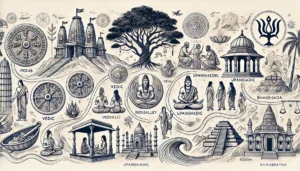The Origin of Hinduism
The Origin of Hinduism: A Journey Through Time and Culture
Hinduism is one of the world’s oldest and most diverse religions, with deep roots stretching back thousands of years. Its origin is not tied to a single founder or a specific moment in time, making it unique among the world’s major religions. Rather, Hinduism is an evolving tradition, shaped by centuries of cultural, philosophical, and spiritual developments. It originated in the Indian subcontinent, where it continues to be practiced by millions today.

The Indus Valley Civilization: The Dawn of Spirituality
The earliest traces of what would eventually evolve into Hinduism can be found in the ancient Indus Valley Civilization, which flourished around 3300 to 1300 BCE in present-day Pakistan and northwest India. Archaeological excavations have uncovered evidence of complex urban centers with sophisticated drainage systems, artwork, and religious artifacts, hinting at early forms of spiritual practices.
Some scholars suggest that the people of the Indus Valley may have worshipped deities associated with nature and fertility, similar to later Hindu gods. The discovery of small figurines, such as the famous “dancing girl” statue and seals featuring animals, indicates a culture with symbolic representations of spirituality. However, much of the religious life of the Indus Valley remains a mystery, as their script has not been deciphered.
The Vedic Period: The Foundation of Hinduism
The next significant phase in Hinduism is the Vedic period of around 1500 BCE with the arrival of the Indo-Aryans in the Indian subcontinent. The Indo-Aryans brought with them the Vedas, a collection of ancient hymns, rituals, and prayers composed in Sanskrit. The Vedas form the foundation of Hindu thought, laying down the essential principles of dharma (righteousness), karma (action and its consequences), and moksha (liberation from the cycle of birth and rebirth).
During this time, the concept of Brahman, the ultimate reality or supreme cosmic power, began to take shape. The Vedic hymns describe a pantheon of gods and goddesses, such as Indra, Agni, and Varuna, who govern various aspects of the natural world. The rituals of sacrifice and meditation were believed to maintain harmony in the universe, and the priestly class, known as the Brahmins, played a crucial role in performing these sacred rites.
The Upanishadic Period: Spiritual Philosophy and Self-Realization
Around 800 BCE, the Upanishads emerged, marking a shift in Hindu thought from ritualistic practices to more philosophical inquiry. The Upanishads are a collection of texts that explore profound questions about the nature of the self (atman), the universe, and the ultimate reality (Brahman). They emphasize the idea of spiritual realization through meditation, introspection, and the pursuit of knowledge.
The Upanishads introduced the concept of the eternal soul (atman) and its connection to Brahman, the ultimate source of all existence. The idea of liberation, or moksha, was further developed as the goal of human life—breaking free from the cycle of birth, death, and rebirth (samsara) through spiritual awakening.
The Classical Period: The Rise of Epics and the Concept of God
By the time of the classical period, around 500 BCE to 500 CE, Hinduism began to take on a more recognizable form, with the composition of two of its most important texts: the Mahabharata and the Ramayana. These epics tell the stories of gods, heroes, and moral dilemmas, providing not only religious teachings but also ethical guidance for everyday life.
The Bhagavad Gita, part of the Mahabharata, is one of the most revered scriptures in Hinduism. In Bhagavad Gita lord Krishna discusses the key principle of Hinduism to Arujn who appears to be confused just before starting the Mahabharat war at Kurukshetra. . The Gita discusses key concepts such as dharma, devotion (bhakti), and selfless action (karma yoga), offering practical wisdom for navigating the complexities of life.
During this time, the concept of personal deities became more prominent. While the Vedic tradition focused on a vast pantheon of gods, the classical period saw the rise of three primary deities: Brahma (the creator), Vishnu (the preserver), and Shiva (the destroyer). These gods are often worshipped in various forms, and the devotion to them, particularly through rituals, prayers, and temple worship, became central to Hindu practice.
The Diversity of Hinduism
Hinduism is often described as a way of life rather than a rigid belief system, and this flexibility has allowed it to evolve over time and absorb a wide range of influences. As the religion spread throughout India and beyond, it encountered various regional traditions, customs, and philosophies, resulting in a diversity of practices and interpretations.
For instance, the development of various schools of philosophy, such as Advaita Vedanta (non-dualism), Dvaita (dualism), and Vishishtadvaita (qualified non-dualism), enriched the intellectual landscape of Hinduism. Additionally, different forms of worship, such as puja (ritual worship), yoga, and pilgrimages to sacred sites, became integral parts of the religion.
Hinduism Today
Today, Hinduism remains a vibrant and diverse religion, with an estimated 1.2 billion followers worldwide. It is primarily practiced in India, Nepal, and Bali, but its influence has spread globally through migration, scholarship, and the diaspora. Hinduism’s rich cultural heritage, philosophical depth, and spiritual practices continue to inspire millions of people on their journeys of self-discovery and spiritual growth.
Hinduism’s origins are deeply rooted in the ancient civilizations of the Indian subcontinent. Through its long history, it has evolved into a religion that emphasizes spirituality, philosophy, and the quest for inner peace. Its diversity and adaptability make it not only one of the oldest religions but also one of the most enduring, with a profound impact on the lives of its followers and the world at large.
One thought on “The Origin of Hinduism”
Happy New year !!